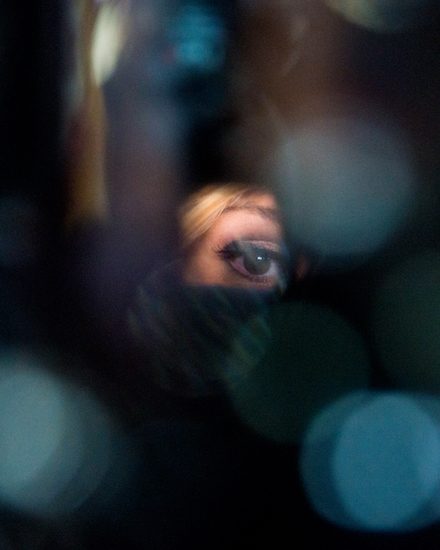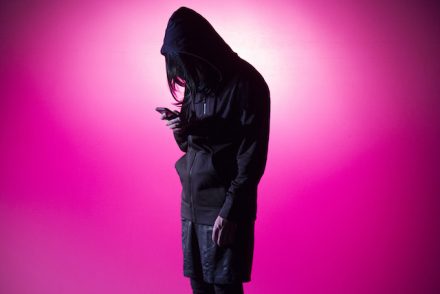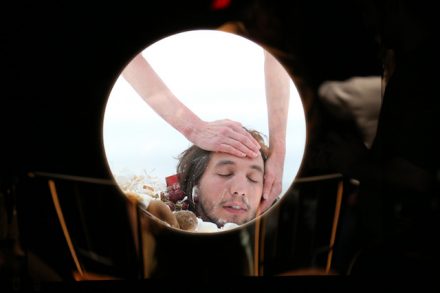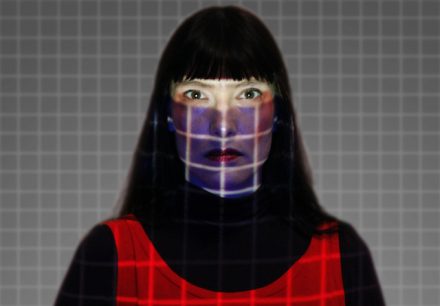(ANNANDALE-on-HUDSON, N.Y.) — “WE’RE WATCHING,” the first major survey of performances by contemporary American artists exploring surveillance and its impact on our identities, takes place at the Fisher Center at Bard College over four days, Thursday, April 27, through Sunday, April 30. Artists include Big Art Group; Annie Dorsen; Hasan Elahi; Michelle Ellsworth; Homi K. Bhabha and Claudia Rankine; John Lucas; Will Rawls; Samuel Miller; and Alexandro Segade.
Traversing an array of 21st-century phenomena such as police body cameras, Reddit comments, facial recognition software, Google Street View, and inscrutable digital interfaces, the seven works in WE’RE WATCHING chronicle current (and sometimes speculative) surveillance technologies and their transformative effect on security, privacy, civil liberties, the ways we form relationships and communities, and our sense of ourselves as citizens.
Organized by Gideon Lester, Artistic Director of Theater and Dance, and Caleb Hammons, Senior Producer, WE’RE WATCHING premieres seven new artworks installed and performed in unexpected ways throughout Frank Gehry’s landmark performing arts center.
“We’ve commissioned a number of artists to make projects that explore different aspects of surveillance, from social media, to government surveillance, to police body cameras, to facial recognition software and Google Maps,” says Lester. “Each of them is asking questions about the way that we live our lives while we’re being watched, and the way that surveillance affects the ways that we think of ourselves in this 21st Century age, where every aspect of our lives is affected by surveillance and surveillance technology in ways that we may understand or that may most of the time be completely invisible to us.”
The program, developed with support from the Goethe-Institute NYC, also includes Spectatorship in an Age of Mass Surveillance, a symposium for artists and scholars that took place at Bard in September 2016, plus undergraduate courses, public events, and a forthcoming special edition of Yale’s Theater magazine.
WE’RE WATCHING features works by artists spanning disciplines — writers, photographers, filmmakers, theater and performance artists, and chorographers — in both traditional and nontraditional spaces in the Fisher Center, including rehearsal studios, wings and storage areas, as well as studios and the theater.
WE’RE WATCHING includes:
-
Big Art Group’s Opacity, which is built around the framework of the “interface,” specifically the threat of increasingly opaque intermediation between the digital and the physical. A lone character lies in their bedroom, swiping the phone in search of contact. As the night deepens, their attempts at intimacy unmask a profound and insurmountable corruption.
- Annie Dorsen’s The Great Outdoors, in which, in the darkness of a planetarium, a performer
guides us on a journey through inner space, stitching together the thoughts of countless individuals
using text culled from internet comments. Dorsen sees comments as the Internet’s id—
unrestrained, anonymous, let loose. Is this id a roiling sea of primal drives? Or a thoroughly
structured and colonized territory?
- Hasan Elahi’s Retina, a Live Arts Bard commission using Google Street View imagery to
interrogate and disorientate our relationship with natural and built environments. In this sitespecific
work, Elahi makes reference to the camera obscura as one of the oldest types of
surveillance technology. His installation interrogates the state’s increasing reliance on publicprivate
partnerships for purposes of surveillance.
-
Michelle Ellsworth’s The Rehearsal Artist, a Live Arts Bard commission. Ellsworth turns a rehearsal studio-turned into laboratory where a small group of audience members peep through a one-way mirror at a performer responding to choreographic instructions, derived from the canon of social science experiments. As the audience’s perception shifts and extends, this iterative and playful performance amplifies and destabilizes the act of watching.
- What Remains, a Live Arts Bard commission from writers Homi K. Bhabha and Claudia Rankine, filmmaker John Lucas and choreographer Will Rawls. What Remains stages encounters for a culture that cannot memorialize without exposing society’s role in the disturbance and murder of its citizens. Through movement, language, and video it invites us across the threshold of this historical void, creating an immersive environment from the idea of an entombed imagination, and responding to violence and disappearance with a resonant, ghostly chorus.
- Samuel Miller’s (Bard College ’15) Foundation for Healing, a new form of Virtual Reality
therapy that focuses on exorcising trauma and hypervigilence caused by living under mass
surveillance. A patient will demonstrate to audiences the intimate methods of mental and spiritual
rejuvenation they use to thrive in a hostile digital landscape.
- Alexandro Segade’s Future St., a sci-fi saga set in a dystopian Southern California city, where a
homosexual police state enforces strict marriage codes among the monitored populace, and an
intersectional resistance, made up of queer mutant dissidents and an ancient feminist underground,
plots its overthrow. Future St. is a speculative, multi-media theater epic exploring desire,
surveillance and the sinister forces of normalization.
WE’RE WATCHING is the second edition of the Fisher Center’s innovative, interdisciplinary Live Arts Bard Biennial. It follows the success of the first edition, The House Is Open (November 2015), which included works by John Kelly, Ralph Lemon, Jennifer Monson, Marc Swanson and Jack Ferver, and Nature Theater of Oklahoma, and was lauded by The New York Times as “an inventive and thoughtfully assembled exhibition.”
Marathon tickets for Saturday, April 29, and Sunday, April 30 — covering all five performances and two installations — are available for $95. Tickets for individual performances Thursday, April 27, through Sunday, April 30, are $25 ($10 for students). All tickets can be purchased at fishercenter.bard.edu or 845.758.7900.




